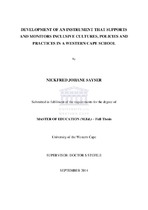| dc.contributor.advisor | Stofile, S. | |
| dc.contributor.author | Sayser, Nickfred Johane | |
| dc.date.accessioned | 2015-05-27T15:19:51Z | |
| dc.date.available | 2015-05-27T15:19:51Z | |
| dc.date.issued | 2014 | |
| dc.identifier.uri | http://hdl.handle.net/11394/4222 | |
| dc.description | Magister Educationis - MEd | en_US |
| dc.description.abstract | The democratisation of the South African government created a policy environment that enabled transformation in every sphere of our society. Transformation of the education sector was marked by the adoption of inclusive education as a constitutional imperative in this country. This resulted in attempts to make ordinary mainstreams schools more accessible to learners with disabilities. The transformation of schools into inclusive institutions is a tedious process that is being further complicated by the contentious nature of the notion of inclusion. The challenge to schools and institutions is that there is no measuring instrument against which schools can measure their own development, and which can inform the process they embark on. Against this backdrop this study aimed at developing an instrument that could guide schools through the process of becoming more inclusive. The question that this study seeks to answer is: What are the indicators that can be used to evaluate the development of inclusive practices in mainstream schools in the Western Cape context? Methodologically the study is set in a qualitative research paradigm that employed a participatory action research method (PAR), that matches the spirit of democracy that permeates the society in which participants in study found themselves in. In-depth interviews were used to pursue the aim of the study. Inclusive education is described in literature as an elusive and contentious concept. This description resonated well with the findings of this study as participants conceptualised inclusive education in a variety of ways. The study explored the three interconnected dimensions of inclusive education to direct the development of inclusive education in a school. This exploration yielded a variety of indicators for each dimension that were categorised in general indicators and more specific indicators. These general and specific indicators, as were foregrounded by the participants, were then collated in an instrument that the stakeholders of the school could use to support and monitor the implementation of inclusive cultures, policies and practices in their school. | en_US |
| dc.language.iso | en | en_US |
| dc.publisher | University of the Western Cape | en_US |
| dc.subject | South African government | en_US |
| dc.subject | Inclusive education | en_US |
| dc.subject | Schools | en_US |
| dc.title | Development of an instrument that supports and monitors inclusive cultures, policies and practices in a Western Cape School | en_US |
| dc.type | Thesis | en_US |
| dc.rights.holder | University of the Western Cape | en_US |

